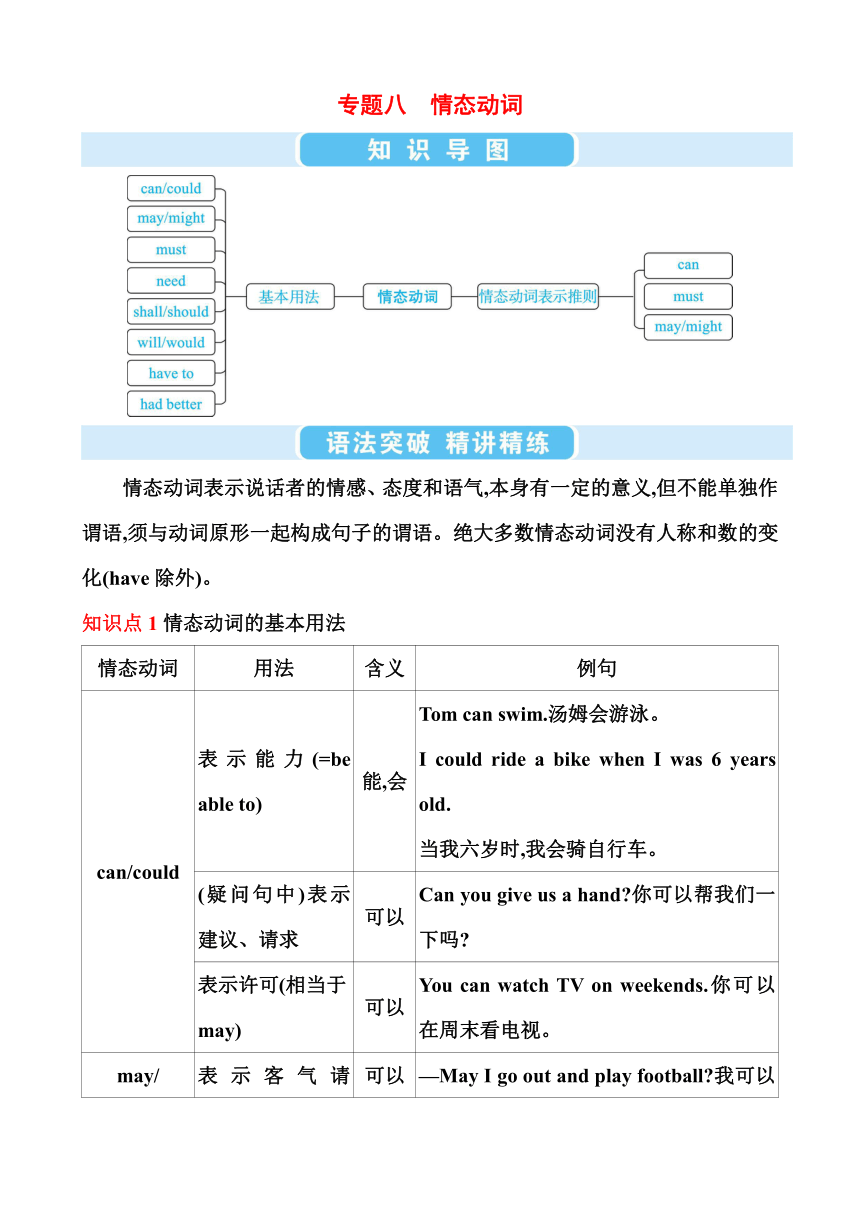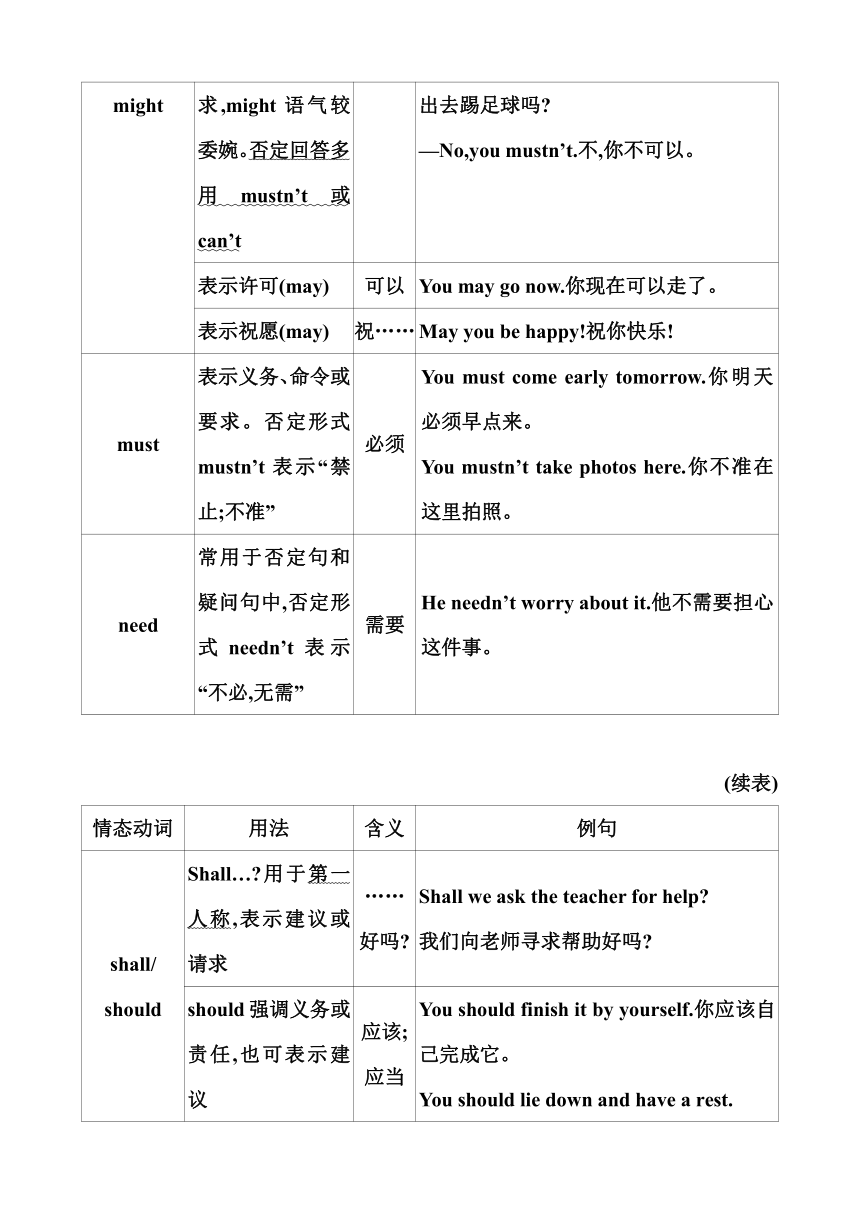08 专题八 情态动词 学案 2025年中考英语语法精讲(人教版)
文档属性
| 名称 | 08 专题八 情态动词 学案 2025年中考英语语法精讲(人教版) |  | |
| 格式 | docx | ||
| 文件大小 | 83.1KB | ||
| 资源类型 | 教案 | ||
| 版本资源 | 人教新目标(Go for it)版 | ||
| 科目 | 英语 | ||
| 更新时间 | 2024-12-17 10:43:58 | ||
图片预览



文档简介
专题八 情态动词
情态动词表示说话者的情感、态度和语气,本身有一定的意义,但不能单独作谓语,须与动词原形一起构成句子的谓语。绝大多数情态动词没有人称和数的变化(have除外)。
知识点1情态动词的基本用法
情态动词 用法 含义 例句
can/could 表示能力(=be able to) 能,会 Tom can swim.汤姆会游泳。 I could ride a bike when I was 6 years old. 当我六岁时,我会骑自行车。
(疑问句中)表示建议、请求 可以 Can you give us a hand 你可以帮我们一下吗
表示许可(相当于may) 可以 You can watch TV on weekends.你可以在周末看电视。
may/ might 表示客气请求,might语气较委婉。否定回答多用mustn’t或can’t 可以 —May I go out and play football 我可以出去踢足球吗 —No,you mustn’t.不,你不可以。
表示许可(may) 可以 You may go now.你现在可以走了。
表示祝愿(may) 祝…… May you be happy!祝你快乐!
must 表示义务、命令或要求。否定形式mustn’t表示“禁止;不准” 必须 You must come early tomorrow.你明天必须早点来。 You mustn’t take photos here.你不准在这里拍照。
need 常用于否定句和疑问句中,否定形式needn’t表示“不必,无需” 需要 He needn’t worry about it.他不需要担心这件事。
(续表)
情态动词 用法 含义 例句
shall/ should Shall… 用于第一人称,表示建议或请求 …… 好吗 Shall we ask the teacher for help 我们向老师寻求帮助好吗
should强调义务或责任,也可表示建议 应该; 应当 You should finish it by yourself.你应该自己完成它。 You should lie down and have a rest. 你应该躺下休息一会儿。
will/ would 表示征求意见(第二人称疑问句中),would语气更委婉 可以…… 吗 Will/Would you please take out the rubbish 你可以把垃圾倒一下吗
will表示意愿、意志(用于多种人称) 愿意 Your parents will try their best to help you. 你的父母愿意尽最大的努力帮助你。
have to 表示客观需求,have要根据主语形式和时态变化 不得不 He has to take a taxi because of the rain. 由于下雨,他不得不乘坐出租车。
had better 表示劝告、建议,had常缩写为’d 最好 You’d better go there today.你最好今天去那儿。
【要点提醒】
1.can与be able to
(1)相同点:后面都接动词原形;都可表示能力。
(2)不同点:can只有一般现在时和一般过去时,即can/could;可以用于否定句或疑问句中,表示判断或推测。be able to有多种时态变化以及人称和数的变化;表示“过去通过努力做成了某件事”只能用be able to。
2.must与have to
(1)must表示说话人的主观意志,意为“必须”,无人称和数的变化。其否定回答通常用don’t have to或needn’t,而不用mustn’t。如:
—Must I finish my homework first 我必须先完成作业吗
—No,you don’t have to/needn’t.不,你不必。
(2)have to 意为“不得不”,往往强调受到外界客观因素的迫使。它可用于多种时态,且有人称和数的变化。如:
It is going to rain.I have to go home now.快下雨了,我得回家了。
We didn’t want to go but we had to.我们并不想去,但是不得不去。
3.以could开头的,表示委婉请求的疑问句,要用can回答,不能用could回答。如:
—Could I borrow this book 我能借这本书吗
—Sorry,you can’t.对不起,你不能。
【学以致用】
1.—I like shopping online because I _______spend a lot of time from shop to shop.
—But I enjoy the pleasure of hanging out.
A.needn’t B.can’t
C.mustn’t D.shouldn’t
2.(2023·湖北武汉)—Excuse me,but we _______wait in line to get on the subway.
—I’ m sorry.
A.might B.would C.could D.should
3.(2023·湖南岳阳改编)—May I use your computer
—Yes,you _______,but first you have to fold the clothes.
A.need B.can C.must D.will
4.(2023·甘肃)—I _______find my keys.
—Have you checked in your jacket pockets
A.mustn’t B.shouldn’t
C.can’t D.wouldn’t
5.(2023·湖南)—_______ I join the volunteer program on weekends
—Of course you can.
A.Can B.Must
C.Should D.Need
知识点2情态动词表推测的用法
情态动词 含义 用法 例句
can can可能; can’t不可能 常用于否定句或疑问句中。有时也用于肯定句中表示推测,表示理论上的可能性,即从理论上或逻辑上分析是可能的,但实际未必会发生 Even experts can make mistakes. 甚至是专家也可能会出差错。
must 一定 表示肯定的推测 Mr.Li must be working now,for the light in his office is still on.李先生一定还在工作,因为他办公室的灯仍然亮着。
may/ might 可能;也许 might的可能性比may小 —Where are you going this summer vacation —这个暑假你打算去哪儿 —I might go to Beijing.But I’m not sure. —我可能去北京,但我不确定。
注:could表示推测时,语气比can要弱,说话者留有余地。如:
—Could it be an animal 它可能是动物吗
—It could not be,because it is not moving.不太可能,因为它不动。
【学以致用】
1.(2023·山东滨州)—The paper cutting is pretty lively.Who made it
—It _______be Mary.None of us except her is able to do it.
A.can B.must
C.need D.might
2.The mother hasn’t given up the hope that her son _______still be alive after the accident.
A.need B.might
C.should D.can’t
3.—It’s important to protect wild animals.
—I totally agree.If we don’t protect them,they _______die out one day.
A.have to B.should
C.need D.may
情态动词表示说话者的情感、态度和语气,本身有一定的意义,但不能单独作谓语,须与动词原形一起构成句子的谓语。绝大多数情态动词没有人称和数的变化(have除外)。
知识点1情态动词的基本用法
情态动词 用法 含义 例句
can/could 表示能力(=be able to) 能,会 Tom can swim.汤姆会游泳。 I could ride a bike when I was 6 years old. 当我六岁时,我会骑自行车。
(疑问句中)表示建议、请求 可以 Can you give us a hand 你可以帮我们一下吗
表示许可(相当于may) 可以 You can watch TV on weekends.你可以在周末看电视。
may/ might 表示客气请求,might语气较委婉。否定回答多用mustn’t或can’t 可以 —May I go out and play football 我可以出去踢足球吗 —No,you mustn’t.不,你不可以。
表示许可(may) 可以 You may go now.你现在可以走了。
表示祝愿(may) 祝…… May you be happy!祝你快乐!
must 表示义务、命令或要求。否定形式mustn’t表示“禁止;不准” 必须 You must come early tomorrow.你明天必须早点来。 You mustn’t take photos here.你不准在这里拍照。
need 常用于否定句和疑问句中,否定形式needn’t表示“不必,无需” 需要 He needn’t worry about it.他不需要担心这件事。
(续表)
情态动词 用法 含义 例句
shall/ should Shall… 用于第一人称,表示建议或请求 …… 好吗 Shall we ask the teacher for help 我们向老师寻求帮助好吗
should强调义务或责任,也可表示建议 应该; 应当 You should finish it by yourself.你应该自己完成它。 You should lie down and have a rest. 你应该躺下休息一会儿。
will/ would 表示征求意见(第二人称疑问句中),would语气更委婉 可以…… 吗 Will/Would you please take out the rubbish 你可以把垃圾倒一下吗
will表示意愿、意志(用于多种人称) 愿意 Your parents will try their best to help you. 你的父母愿意尽最大的努力帮助你。
have to 表示客观需求,have要根据主语形式和时态变化 不得不 He has to take a taxi because of the rain. 由于下雨,他不得不乘坐出租车。
had better 表示劝告、建议,had常缩写为’d 最好 You’d better go there today.你最好今天去那儿。
【要点提醒】
1.can与be able to
(1)相同点:后面都接动词原形;都可表示能力。
(2)不同点:can只有一般现在时和一般过去时,即can/could;可以用于否定句或疑问句中,表示判断或推测。be able to有多种时态变化以及人称和数的变化;表示“过去通过努力做成了某件事”只能用be able to。
2.must与have to
(1)must表示说话人的主观意志,意为“必须”,无人称和数的变化。其否定回答通常用don’t have to或needn’t,而不用mustn’t。如:
—Must I finish my homework first 我必须先完成作业吗
—No,you don’t have to/needn’t.不,你不必。
(2)have to 意为“不得不”,往往强调受到外界客观因素的迫使。它可用于多种时态,且有人称和数的变化。如:
It is going to rain.I have to go home now.快下雨了,我得回家了。
We didn’t want to go but we had to.我们并不想去,但是不得不去。
3.以could开头的,表示委婉请求的疑问句,要用can回答,不能用could回答。如:
—Could I borrow this book 我能借这本书吗
—Sorry,you can’t.对不起,你不能。
【学以致用】
1.—I like shopping online because I _______spend a lot of time from shop to shop.
—But I enjoy the pleasure of hanging out.
A.needn’t B.can’t
C.mustn’t D.shouldn’t
2.(2023·湖北武汉)—Excuse me,but we _______wait in line to get on the subway.
—I’ m sorry.
A.might B.would C.could D.should
3.(2023·湖南岳阳改编)—May I use your computer
—Yes,you _______,but first you have to fold the clothes.
A.need B.can C.must D.will
4.(2023·甘肃)—I _______find my keys.
—Have you checked in your jacket pockets
A.mustn’t B.shouldn’t
C.can’t D.wouldn’t
5.(2023·湖南)—_______ I join the volunteer program on weekends
—Of course you can.
A.Can B.Must
C.Should D.Need
知识点2情态动词表推测的用法
情态动词 含义 用法 例句
can can可能; can’t不可能 常用于否定句或疑问句中。有时也用于肯定句中表示推测,表示理论上的可能性,即从理论上或逻辑上分析是可能的,但实际未必会发生 Even experts can make mistakes. 甚至是专家也可能会出差错。
must 一定 表示肯定的推测 Mr.Li must be working now,for the light in his office is still on.李先生一定还在工作,因为他办公室的灯仍然亮着。
may/ might 可能;也许 might的可能性比may小 —Where are you going this summer vacation —这个暑假你打算去哪儿 —I might go to Beijing.But I’m not sure. —我可能去北京,但我不确定。
注:could表示推测时,语气比can要弱,说话者留有余地。如:
—Could it be an animal 它可能是动物吗
—It could not be,because it is not moving.不太可能,因为它不动。
【学以致用】
1.(2023·山东滨州)—The paper cutting is pretty lively.Who made it
—It _______be Mary.None of us except her is able to do it.
A.can B.must
C.need D.might
2.The mother hasn’t given up the hope that her son _______still be alive after the accident.
A.need B.might
C.should D.can’t
3.—It’s important to protect wild animals.
—I totally agree.If we don’t protect them,they _______die out one day.
A.have to B.should
C.need D.may
同课章节目录
- 词法
- 名词
- 动词和动词短语
- 动词语态
- 动词时态
- 助动词和情态动词
- 非谓语动词
- 冠词
- 代词
- 数词和量词
- 形容词副词及其比较等级
- 介词和介词短语
- 连词和感叹词
- 构词法
- 相似、相近词比较
- 句法
- 陈述句
- 一般疑问句和否定疑问句
- 特殊疑问句及选择疑问句
- 反意疑问句
- 存在句(There be句型)
- 宾语从句
- 定语从句
- 状语从句
- 主谓一致问题
- 简单句
- 并列句
- 复合句
- 主谓一致
- 主、表语从句
- 名词性从句
- 直接引语和间接引语
- 虚拟语气
- 感叹句
- 强调句
- 倒装句
- 祈使句
- 句子的成分
- 句子的分类
- 题型专区
- 单项选择部分
- 易错题
- 完形填空
- 阅读理解
- 词汇练习
- 听说训练
- 句型转换
- 补全对话
- 短文改错
- 翻译
- 书面表达
- 任务型阅读
- 语法填空
- 其他资料
